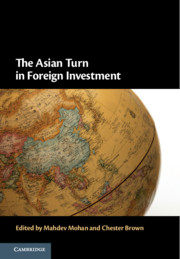Book contents
- The Asian Turn in Foreign Investment
- The Asian Turn in Foreign Investment
- Copyright page
- Contents
- Figures
- Tables
- Contributors
- Acknowledgements
- Table of Cases
- Table of Treaties
- Abbreviations
- Part I Introduction
- Part II National Approaches within Asia to the Regulation and Protection of Foreign Investment
- 2 Investment Agreements and Dispute Settlement in Singapore
- 3 Pharmaceutical Patents and Expropriation in Indian Bilateral Investment Treaties
- 4 Out with the Old, In with the New?
- 5 China and the Investment Treaty Regime
- 6 Procedural Models to Upgrade BITs
- Part III The Rebalancing of Regulatory Space and Investor Protection in Asia
- Part IV Multilateral Rule-Making in Asia on Trade and Investment: From ASEAN to the Comprehensive and Progressive Agreement for Trans-Pacific Partnership
- Part V Emerging Issues
- Part VI What Lies Ahead?
- Index
3 - Pharmaceutical Patents and Expropriation in Indian Bilateral Investment Treaties
from Part II - National Approaches within Asia to the Regulation and Protection of Foreign Investment
Published online by Cambridge University Press: 13 August 2021
- The Asian Turn in Foreign Investment
- The Asian Turn in Foreign Investment
- Copyright page
- Contents
- Figures
- Tables
- Contributors
- Acknowledgements
- Table of Cases
- Table of Treaties
- Abbreviations
- Part I Introduction
- Part II National Approaches within Asia to the Regulation and Protection of Foreign Investment
- 2 Investment Agreements and Dispute Settlement in Singapore
- 3 Pharmaceutical Patents and Expropriation in Indian Bilateral Investment Treaties
- 4 Out with the Old, In with the New?
- 5 China and the Investment Treaty Regime
- 6 Procedural Models to Upgrade BITs
- Part III The Rebalancing of Regulatory Space and Investor Protection in Asia
- Part IV Multilateral Rule-Making in Asia on Trade and Investment: From ASEAN to the Comprehensive and Progressive Agreement for Trans-Pacific Partnership
- Part V Emerging Issues
- Part VI What Lies Ahead?
- Index
Summary
Globally, foreign investors are increasingly making use of the investor-State dispute settlement (ISDS) mechanism to challenge host State’s regulatory measures pertaining to intellectual property rights (IPR).Against this global backdrop, this chapter examines whether regulatory measures, in particular the compulsory licensing of pharmaceutical patents - an important public health flexibility measure - amounts to indirect expropriation under India’s bilateral investment treaties (BITs) and investment chapters in India’s free trade agreements (FTAs).The chapter finds that there is no one answer that can be given to this question.The outcome will depend on the language of the treaty.Those BITs and FTA investment chapters that specifically exempt issuance of compulsory licenses from the ambit of expropriation subject to some conditions provide more regulatory space to India.In case of other BITs that are silent on this, the outcome will depend on the approach adopted by the ISDS tribunals that is whether the tribunals relies upon the "sole effects" test or the "police powers" test to determine indirect expropriation.The chapter also discusses the 2016 Indian Model BIT that puts issuance of compulsory licensing outside the ambit of the BIT provided such issuance is consistent with the Trade Related Aspects of Intellectual Property Rights (TRIPS) agreement.
- Type
- Chapter
- Information
- The Asian Turn in Foreign Investment , pp. 29 - 47Publisher: Cambridge University PressPrint publication year: 2021



